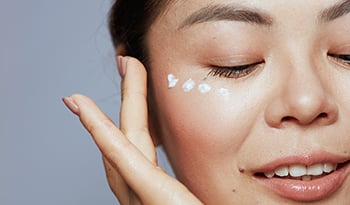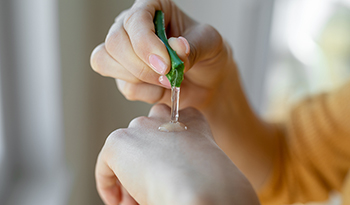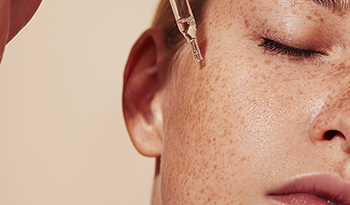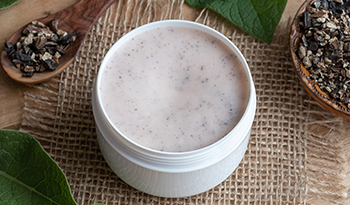Sort sæbe: Fordele og hvordan man bruger det
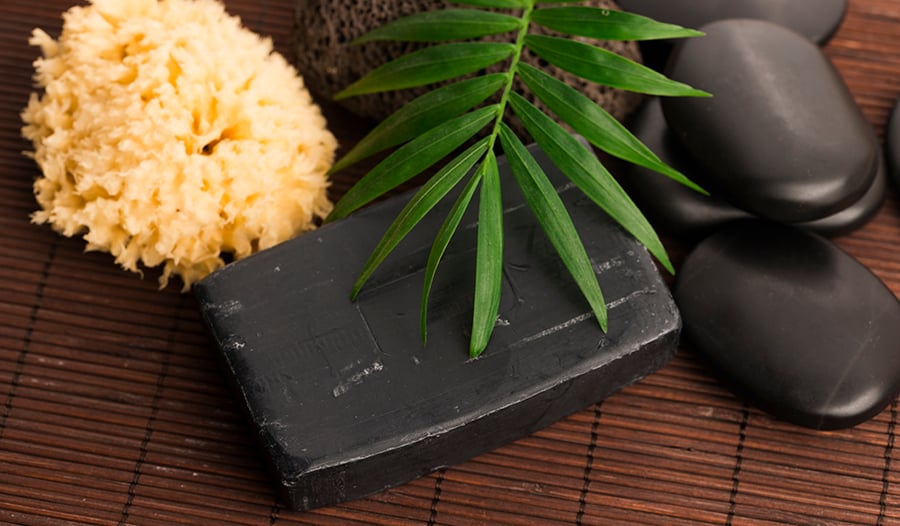
Jeg elsker at opdage nye kropsplejeprodukter, så jeg blev begejstret for at lære om sort sæd. Selvom jeg havde hørt om det i forbifarten, havde jeg ikke undersøgt dets mange fordele - indtil for nylig. Siden vi lærte alt, hvad det har at tilbyde, er denne unikke sæbe blevet en husfavorit for os og et produkt, jeg ofte anbefaler.
Hvis du ligesom mig er nysgerrig efter denne unikke farvede sæbe, og hvorfor den er blevet populær, er du på det rigtige sted! Læs videre for at lære mere om sort sæd, dens fordele og hvordan du bruger det.
Hvad er sort sæbe?
Black Soap er en sæbe fremstillet ved hjælp af brændt kakaomælge eller ristet plantainhudmaske kombineret med en eller anden form for olie, såsom kokosnød eller palme. Selvom dette er den traditionelle sædebase, inkluderer nogle sorter sheasmør, aloe vera og honning. Asken giver sort sæbe sin bror en mørk nuance.
Oprindeligt fra Vestafrika er ægte sort sæbe mørkebrun eller grå i farven med en ujævn overflade. Du kan endda bemærke, at sædets hjørner let smuldrer. Ægte sorte sæder er fri for tilsætningsstoffer og lavet uden beslag eller tildelte dufter. Men dens appel strækker sig ud over dens naturlige, tilsætningsfrie ingrediensliste - sort sæd er fyldt med fordele ud over simpel rengøring!
Fordele ved sort sæd
Mens sort sæbe er et fremragende rengøringsmiddel til dine hænder eller krop, har de mange andre anvendelser og fordele.
Antibakterielle egenskaber
Traditionel sort sæd kan hjælpe med at fjerne skadelige bakterier sammen med snavs og urenheder. Faktisk har sort sæd antibakterielle egenskaber, der kan hjælpe med at forhindre E.coli og Staph bakterielle infektioner. En undersøgelse viste, at traditionelt fremstillet sort sæd havde højere niveauer af antimikrobiel aktivitet end konventionelle medicinske sæder.1
Sikker til de fleste hudtyper
Mange sæder indeholder ingredienser som duft, farvestoffer og svampe, der kan irritere huden - især for dem med følsom hud eller eksem. Sort sæd er et glimrende valg for de fleste mennesker med en række hudtyper, fordi den er fri for disse tilsatte ingredienser. Afbryd brugen og kontakt din hudlæge, hvis du oplever ubehag eller bivirkninger, når du bruger sæd, herunder sort sæd.
Kan behandle acne og pletter
Sort sæd kan hjælpe med at reducere acne og pletter på flere måder. For det første kan dets antimikrobielle egenskaber reducere antallet af acne-fremkaldende bakterier på hudens overflade. For det andet kan sort sæbe forbedre balancen mellem olier på din hud og fremme et pletfrit udseende. Endelig kan sort sæbe, der indeholder honning, mindske hudbetændelse, hvilket reducerer sandsynligheden for pletter og acne. Sort sæd kan også tjene som eksfoliant, der hjælper med at fjerne døde hudceller, der kan stoppe porer og føre til pletter.
Tjek denne artikel for mere information om bekæmpelse af acne og en hudlæges svar på de mest almindelige hudplejemåder.
Affolierer huden
Mens de fleste andre barsæder er glatte at røre ved, har sort suppe en eksfolierende tekstur. Aske, brændte kakaobælge og plantainskind, der bruges i traditionel sort sæd, tjener alle som naturlige eksfolierende midler til huden og fjerner forsigtigt døde hudceller, der potentielt kan stoppe porer og hårsække og føre til pletter, hudormer og indgroet hår. Sort sæd er et godt alternativ til kemiske eksfolianter, der er hårdere på huden og tolereres mindre af følsomme hudtyper.
Kan behandle hudsvampe
Svampe er synderen ved mange almindelige problemer som skæl, fodsvamp og tåneglesvamp. Forskning tyder på, at traditionelt fremstillet sort sæd har svampedræbende egenskaber, der kan hjælpe med at behandle disse almindelige sundhedsproblemer og andre former for svampe.2 Aske fra tørrede kakaobælge, der bruges i sort sæd, kan hjælpe med at hæmme væksten af bakterier og mikroorganismer. Derudover har honning sine egne antiseptiske og svampedræbende egenskaber, hvilket giver sort sæd yderligere fordele ved at beskytte huden og behandle visse bakterielle og svampetilstande.
Reducerer betændelse
Sort sæd indeholder vitamin A og E, to mikronæringsstoffer med stærke antioxidantgener. Ud over at beskytte kroppen mod frie radikaler kan antioxidanter også reducere betændelse. Visse hudtilstande, såsom rosacea, fører til ubehagelig og mærkbar betændelse. Brug af sort sæbe kan hjælpe med at reducere denne betændelse og potentielt forbedre de underliggende tilstande, der forårsager den. Honning, en anden almindelig ingrediens i sort sæd, tilbyder yderligere antiinflammatoriske egenskaber.
Behandler skæl
Selvom navnet antyder, at det kun kan bruges som sæbe, kan sort sæbe også bruges som shampoo. Skær er en hovedbundstilstand med mange årsager - tør eller fedtet hud og svampe er de mest almindelige. Når den bruges som shampoo, kan sort sæbe hjælpe med at forbedre skæret på flere måder. Dens svampedræbende egenskaber kan mindske væksten af mælkefremkaldende svampe i hovedbunden, hjælpe med at forbedre balancen mellem olier på huden og hydrere huden.
Fugtig hud
Almindelige ingredienser i sort sæd, såsom sheasmør og kokosolie, tilføjer stærke fugtgivende fordele. Disse olier kan låse fugt ind, hvilket hjælper med at forbedre hudens hydrering og lindre fugt, der ofte er forbundet med tørhed i huden. Sort sæbs næringssammensætning, herunder dets høje E-vitaminindhold, kan også hjælpe med at øge hudens fugtighed. For flere tip til hydrering af din hud, tjek denne blog.
Sådan bruges sort sæd
Før du begynder at bruge sort sæd - eller et nyt produkt - over hele kroppen, skal du teste et lille hudområde for at sikre, at du ikke reagerer på nogen af dets ingredienser. Dette er især vigtigt for dem med følsom hud.
Start med at fugte dine hænder og skumme sædet, før du påfører det på din hud. Når sædet er skummet i din hånd, skal du massere det på din hud, ligesom du ville gøre med enhver anden sæd eller kropsvask. Skyl det derefter helt af og fortsæt med dine sædvanlige hud- og hårplejemaskiner.
Potentielle bivirkninger af sort sæd
Selvom sort sæd generelt er sikkert for de fleste mennesker, kan nogle opleve milde bivirkninger.
- Hudirritation: Hvis du bruger for meget sæd - eller hvis du bruger det for ofte - kan din hud tørre ud, hvilket kan føre til irritation. For at undgå dette skal du begynde at bruge sort sæbe to til tre gange om hukommelsen og øge frekvensen baseret på din tolerance. Fugt altid godt efter brug af sort sæbe for at mindske potentiel tørhed.
- Rødme: Fordi sort sæd er en naturlig eksfoliant, kan folk med følsom hud opleve rødme, når de først bruger den. Hvis du bemærker dette, skal du reducere mængden af sæd, du bruger, og bruge sjældnere for at undgå irritation.
- Acne eller udslæt: De naturlige eksfolianter i sort sæd kan være hårde for følsom hud, hvilket kan føre til udslæt, buler eller acne hos nogle. Hvis du oplever dette, skal du kontakte din hudlæge, inden du fortsætter med at bruge sort sæbe.
Sådan laver du sort sæd
Selvom du kan købe sort sæbe, er det nemt at lave din egen derhjemme!
- Start med at blande vand og kaliumchlorid (kaliumcarbonat) i en gryde over medium varme. Rør lejlighedsvis, skrab siderne, indtil blandingen begynder at ligne hakket kød.
- Varm din valgte olie i en separat gryde ved svag varme. Kokosolie er en god mulighed.
- Kombiner 1,8 ounce kaliumbase med 6 ounce varmt vand. Hæld derefter blandingen i gryden med den flydende olie. Bring varmen til høj, indtil den er kogt, og luk derefter blandingen for varme, så opløsningen bliver tykkere og afkølet.
- Lav asken ved at male tørrede, tømte kakaomælge, indtil de ligner sod. Du kan også bruge plantainskræl.
- Tilsæt asken til den afkølede blanding af olie og kaliumchlorid og bland. Overfør til en opbevaringsbeholder, og lad den sidde i fri luft i cirka 48 timer før brug.
Takeaway
Fordelene ved sort sæd går langt ud over fordelene ved traditionel sæbe. Ud over at være et godt rengøringsmiddel og naturligt eksfoliant, kan Sort sæd hjælpe med at behandle eller forhindre visse hudsygdomme og svampeinfektioner. Lavet med minimale, naturlige ingredienser, kan sort sæbe generelt bruges af en bred vifte af mennesker med få bivirkninger. Udforsk hele sortimentet af sorte sæbeprodukter på markedet for at udnytte dens mange fordele i din hudplejerutine.
Referencer:
- (PDF) Sammenligningsundersøgelser af effekten af lokalt fremstillet sort sæd og konventionelle medicinske sæder på isoleret menneskelig hudlidelse. Udgået 12. juli 2024.
- Sg J, Am E, Oj O, Bj B, Mo E, Do D. Antifungale potentialer af indfødt sort sæd, der almindeligvis bruges i Ibadan, Nigeria. Academia Arena. 2013; 5 (7). Udgået 14. juli 2024.
ANSVARSFRASKRIVELSE: Wellness Hub har ikke til hensigt at stille diagnoser...

















































































 Indholdsfortegnelse
Indholdsfortegnelse




